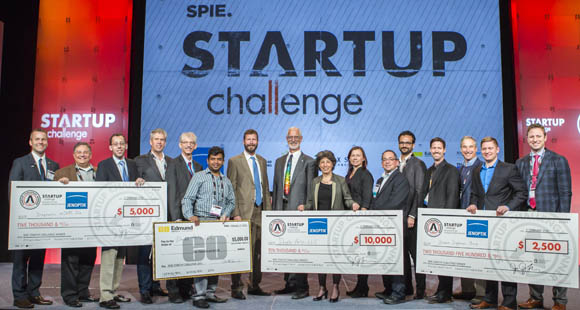Cash prizes, top-value networking, and mentorships will go to winners of pitch contest for light-based technology products

Winners and judges display some of their prizes following the SPIE Startup Challenge 2016 final competition last February at SPIE Photonics West.
BELLINGHAM, Washington, and WASHINGTON, DC, USA —The application deadline is fast approaching for an opportunity for new photonics entrepreneurs to pitch their light-based technology product ideas to a team of business development experts and venture capitalists — and win a share of more than $85,000 in cash, prizes, and support.
Written applications to enter the seventh annual SPIE Startup Challenge 2017 are due by 18 November to SPIE, the international society for optics and photonics. The competition is held during SPIE Photonics West at the Moscone Center in San Francisco, running 28 January through 2 February, enabling new entrepreneurs to pitch their business plans to corporate development experts and venture capitalists.
Cash prizes, including $10,000 for first prize, $5,000 for second prize, and $2500 for third are funded by Founding Partner Jenoptik. Trumpf, Open Photonics, and Edmund Optics, which also awards the first-place winner $5,000 in products, will be joined by the U.S. National Science Foundation as Supporting Sponsors of the competition.
Semifinalists, finalists, and winners are widely promoted by competition host SPIE and on industry news site optics.org.
Twenty semifinalists each receive:
The top six semifinalists selected by judges in the first round also receive:
Part of the value of the competition is that it teaches entrepreneurs about the differences in priority placed on commercialization as compared to academic research, said Adam Wax, a professor at Duke University who has served as a judge and mentor for several past events. This understanding is essential for connection with venture capitalists, he noted.
While the money is important ("to a startup, every dollar counts"), said 2016 winner Leslie Kimerling of Double Helix, "one of the most important benefits is the mentoring, coaching, and advice you get. Probably the most important is the networking and the community that you continue to build."
Feedback from judges who "have been there, have done that," is very valuable, said 2014 winner Robert McLaughlin of the University of Western Australia. "Especially as an engineer, there is a whole world of complexity in going from technical problems to commercialization. They taught me an awful lot about how do I get from an idea to actually turning it into a company where I can get it out into the world and make a difference."
Eligible applicants must present an optics or photonics technology or application as the basis for a viable new business. Because the event focuses on new businesses and potential startups, established companies must be pre-revenue at the time of the competition and may not have sold any products.
Written applications will be evaluated by a team of expert judges, who will select 20 semifinalists to deliver oral pitches on Tuesday 31 January. A second panel of judges will select the top six pitches for participation in the public final round on Wednesday 1 February, where judges will choose and announce the winners.
Oral pitches for both rounds of the Startup Challenge may not exceed five minutes.
Winning projects in the 2016 SPIE Startup Challenge were a 3D nanoscale imaging system from Double Helix, a marijuana breathalyzer from Diagnostic AnSERS, and a disease diagnostic tool made with refrigerator magnets and a laser pointer from Disease Diagnostic Group.
Application, eligibility, structure, rules, and other information is at www.spie.org/startup.
About SPIE
SPIE is the international society for optics and photonics, an educational not-for-profit organization founded in 1955 to advance light-based science, engineering and technology. The Society serves nearly 264,000 constituents from approximately 166 countries, offering conferences and their published proceedings, continuing education, books, journals, and the SPIE Digital Library. In 2015, SPIE provided more than $5.2 million in support of education and outreach programs. www.spie.org
Contact:
Amy Nelson
Public Relations Manager
amy@spie.org
+1 360 685 5478
@SPIEtweets